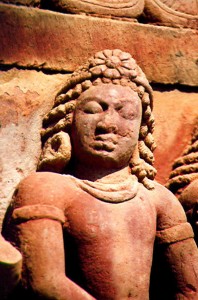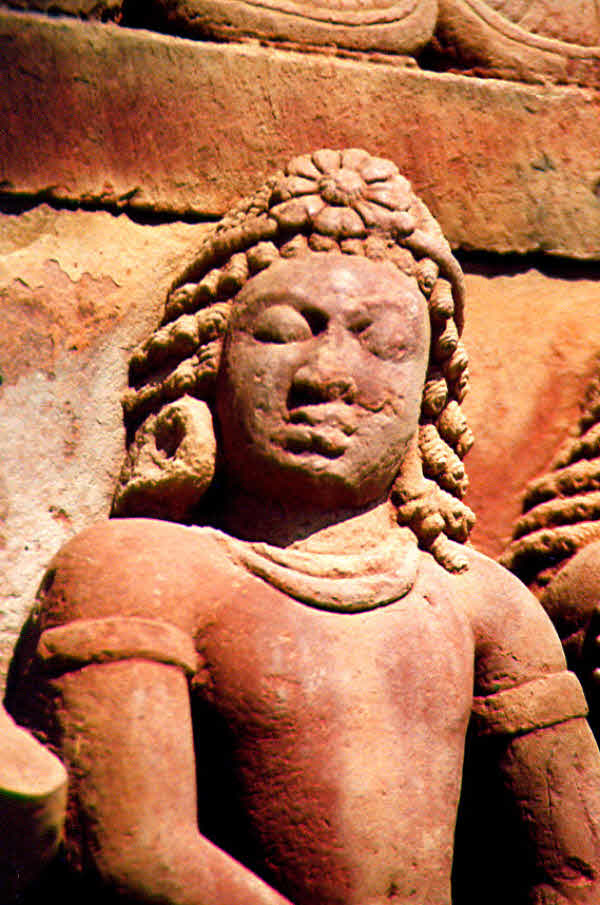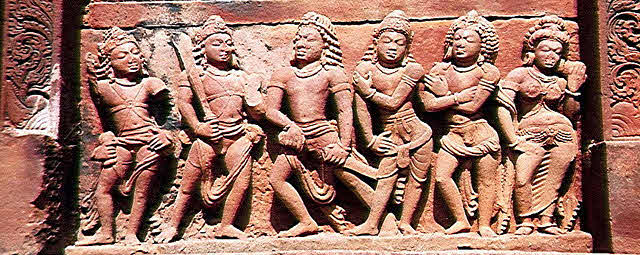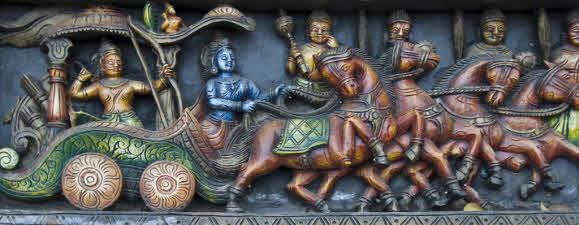by P.R.Viswanathan
[box]More often than not, conversations between a father and a daughter can prove to be really interesting and at its best, intellectually stimulating. Here is a story of a dad and a daughter discussing who is the real hero among the five Pandava brothers in the epic, Mahabharata.[/box]“Yudhishtira?” Anuradha questioned, the contempt evident in her voice, in response to an impassioned three minute eulogy she had just heard of the oldest of the Pandavas. For good measure she added:
 “That loser, Dad, how can you speak of him so highly?”
“That loser, Dad, how can you speak of him so highly?”
“Oh! Sorry, I am sorry”, she added hastily, remembering her father’s oft-expressed objection to that epithet even when applied to ordinary living folk and now she had dared to refer to that great keeper of the dharma, Dharmaputra, as a loser.
They had had this conversation on quite a few occasions in the past but this time it was extended. Dad had retired, it was a Sunday and the family was at the breakfast table.
Vishnu had still not responded when Anuradha continued:
“Like Kalyan uncle says, Bhima and Arjuna are the brave ones, who undertook all those great expeditions to humble or eliminate evil humans and demons threatening the kingdom, and helped it expand. I think the Mahabharata revolves entirely around them.”
“Nonsense!” said Vishnu “of course Bhima and Arjuna are the bravest of warriors. But would you say the Prime Minister’s security guards or the country’s armed forces are more important than the PM himself? Yudhishtira was the keeper of dharma – Dharmaputra. Arjuna and Bhima and all the others were there to provide the strength of arm to safeguard that dharma; that was their privilege. Can there be any doubt that the Mahabharata is all about dharma and Yudhishtira its hero?
“And pray tell me, what the hell you mean by ‘loser’. I have never understood because you use it so loosely. It has a terrible ring to it though.”
“In this case, it should not be a problem Dad,” said Anu mischievously, “he lost his wife and his kingdom.”
“And,” she continued, reinforcing her earlier point, “don’t forget, both were hard won by Arjuna and Bhima. And your great Dharmaputra staked them in a game of dice. Even the kingdom is okay Dad, but his wife! I will never forgive him. And you talk so much law, Dad, I am sure you know that what he did was illegal. He had staked himself and lost. He had no authority to stake anything else after that. Draupadi did bring this point to his notice and everyone else’s. Now that’s some woman. Whatever you might say about the hero, for me Draupadi is the heroine of the Mahabharata.”
“Now,” said Vishnu, “listen carefully and understand. Vedavyasa could very well have made Yudhishtira a paragon of perfection. The staking of Draupadi and her subsequent vasthraharan (stripping), though so much talked of – it was such an outrageous and ugly act – is not, in my opinion, central to the Mahabharata. The point that I believe Vedavyasa wanted to make is that even the best of men like Yudhishtira suffered from defects. Also, he wanted to show how when you indulge in a weakness like that, you can get carried away. You can lose your mind as Yudhishtira did.
“Look at a man like Gandhiji. I believe his backing of the Khilafat movement and his indifference to the plight of the Hindus in the related Moplah rebellion was retrograde by any standard. Similarly Subhash Chandra Bose despite being popularly elected as Congress President against Gandhiji’s candidate (Pattabhi Sitaramayya) had to resign under pressure from Gandhiji. I consider that act of Gandhiji undemocratic, to say the least. Yet, we cannot deny his greatness. Why talk of human beings? Rishis and the Gods themselves have weaknesses. Do you know of the great sage Brihaspati, the Guru of the Gods? Lauded by one and all as the wisest of men, he was still consumed by envy whenever his brother received any praise for his great learning.
What about Vishwamitra succumbing to Menaka’s charms or Lord Shiva to Mohini’s? So, Yudhishtira had this one great weakness, for gambling.”
Anuradha kept quiet, her face registering doubt, for a while and then said:
“Yeah, I suppose all these guys in the Mahabharata are grey characters – to that extent realistic.”
Vishnu continued:
“Also, we shouldn’t forget that according to the code of the Kshatriyas, one could not refuse a game of dice.”
“Come on Dad! Now you make it sound as if Yudhishtira was doing something wonderful with all this talk of code.”
“No! I did not mean that at all. Yudhishtira mainly yielded to his one great weakness. I was only mentioning the code as an additional point and it is true. There did exist such a code, I am not fabricating it. It is a similar code that prevented Arjuna and Bhima from picking up their arms when the Kauravas shamelessly stripped Draupadi. Bhima took an oath to tear Dushasana’s hand. Why did he not do it there and then?”
“Good points. Dad, but somehow, I still feel Arjuna and Bhima are the heroes. And between them, I choose Arjuna; this is personal. Bhima is rather savage; you know hogging himself all the time and so forth. Very un-cool! And I also like Arjuna because on the battlefield, he was beset by doubts and asked all those great questions to Lord Krishna. So he was not just a security guard. He was the first to hear the word of God, Bhagvad Gita.”
“Of course, he was not just a security guard. Whoever doubts the intellect and nobility of Arjuna or even un-cool Bhima? They were always on the side of dharma but that dharma is exemplified by their older brother Dharmaputra. On the other hand don’t forget, Yudhishtira was no mean fighter himself. He was a very brave warrior. He did his utmost to be at peace with his cousins but when all efforts including the last ditch peace mission of Lord Krishna himself failed, he decided on war. After that he had no doubts. He knew what his dharma was. Grateful as we all should be to Arjuna for provoking the Bhagavad Gita, we should remember that Yudhishtira had none of the questions that tormented Arjuna.
I don’t blame you Anu. Arjuna and to some others, Bhima are so obviously the romantic figures – on horseback with sword or club in hand. Particularly for young girls! But we must be fair when it comes to assessment.”
“Okay Dad,” Anu said resignedly, “but I do think you are being unfair too.”
“Unfair. Why? To whom?”
“You haven’t said a word about Nakula and Sahadeva.”
Without waiting for Vishnu’s reply, Anu went to her room and shut herself up. She had the last word after all.
Pics : vaticanus – http://www.flickr.com/photos/vaticanus/
thaths – http://www.flickr.com/photos/thaths/
[box type=”info”]DID YOU KNOW? The post you just read is also a part of a PDF that looks just like a magazine in print and can be downloaded? Well, we also have another option that lets you flip and read the issue like a magazine. It’s so full of colours and the best part is you have all the contributions in one place! Take our word for it and don’t miss it. Click on the buttons below to access the same![/box] [button link=” https://sparkthemagazine.com/wp-content/uploads/2011/04/Spark-April-2011.pdf” color=”orange”]click here to download the april 2011 issue as a PDF.[/button] [button link=”http://issuu.com/sparkeditor/docs/spark-april-2011?mode=embed&layout=http%3A%2F%2Fskin.issuu.com%2Fv%2Fcolor%2Flayout.xml&backgroundColor=000000&showFlipBtn=true” color=”red”]click here to flip and read the april 2011 issue like a magazine[/button] [facebook]share[/facebook] [retweet]tweet[/retweet]






